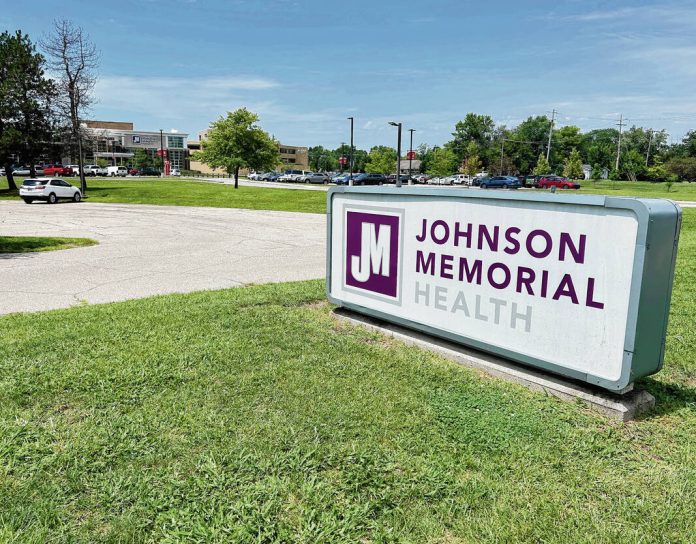
Johnson Memorial Hospital, like hospitals across Indiana, have struggled as operating costs have increased while they deal with a lack of reimbursements from Medicaid and Medicare. Hospitals officials are hoping to work with state legislators to find a solution to the issue. RYAN TRARES | DAILY JOURNAL
The prognosis is dire.
Johnson Memorial Health has felt the financial pain in the years following the COVID-19 pandemic. Operation costs — for everything from hospital beds to medical supplies — continue to rise as inflation has gripped the country. Reimbursements from the Indiana government for Medicaid and Medicare do not cover the costs of care the hospital incurs. Insurance providers increasingly delay or deny payments for care already provided.
The health care system has struggled to continue offering its high standard of care. In some cases, positions have been eliminated.
“We’re being asked to do more with less. Until reimbursement improves, we’ve had to make some tough choices,” said Dr. David Dunkle, president and CEO of Johnson Memorial Health.
Johnson Memorial Health’s plight is shared by hospitals across Indiana. Inflation and lack of insurance reimbursements from Medicaid and Medicare have hammered the state’s hospitals, resulting in a .9% operating margin — far below the 2.3% margin for hospitals in the United States.
Even as hospitals continue to see increased admissions and serve more patients, the situation is not sustainable, Dunkle said.

“The good thing is our care remains excellent. We continue to provide top-quality care that puts the patient first in everything we do,” he said. “But as a family physician at heart, I worry that we’ll be able to provide the same number of services in the future.”
In May, the healthcare management consultants Kaufman Hall released a report, “Current State of Indiana Hospital Finances.” The report outlined the significant challenges facing the state’s health care systems, even beyond the operating margins lagging behind national averages.
Expenses were persistently high, as operating costs increased 4.6% in 2023. Hospital costs for medical supplies and other non-labor expenses both rose higher than the national average, according to the report.
Non-labor costs, which include supplies, services such as tech support, drugs and other miscellaneous expenses, increased 9.7% in Indiana. The national level was 7.2%.
Other expenses, including the Hospital Assessment Fee — the tax hospitals pay to help fund Indiana’s Medicaid program — increased 9.5%, at a much higher rate than hospitals nationally. Indiana hospitals’ Medicaid reimbursement rates, which rank far below the national average, also contributed to significant financial challenges, the report found.
According to the study, Indiana hospitals saw a $731 million decline in income compared to pre-pandemic levels.
“The financial strain on hospitals is of great concern as expenses rise and government reimbursement covers far below the cost of care — especially in Indiana,” said Brian Tabor, president of the Indiana Hospital Association. “Our hospitals remain committed to providing quality care across the state, but we must ensure they have the resources they need to remain viable in their communities.”
The impact is felt across the medical spectrum, from rural hospitals to urban healthcare systems.
In July, Community Health Network reported a 44% drop in operating income for the first half of the year. The decrease comes despite seeing more admissions, emergency department visits, deliveries and physician outpatient visits.
Community Health reported that rising expenses included salaries, wages and other employee costs (up 5.1%); drugs, implants and other supplies (up 9%); laboratory costs and higher contract labor (up 16.4%); insurance premiums, provider assessment taxes and other miscellaneous expenses (up 27%); and software service contracts, repairs and maintenance and trash removal (up 15.1%), the Indianapolis Business Journal reported.
Community Health also pointed to increased revenue deductions and uncompensated care during the period. Admissions rose 4.5% and emergency visits climbed 5%. But outpatient surgeries fell 3.5% and inpatient surgeries fell 2.4%.
At Johnson Memorial Health, 65% to 70% of their business comes from Medicaid and Medicare. But the reimbursement rates approved by the state of Indiana fall well short of covering the costs of care for those patients, Dunkle said. Hospitals receive about 57 cents of every dollar for approved Medicaid claims and 82 cents for Medicare.

Difficulties from insurance providers exasperate those shortfalls.
“We have seen an incredibly different strategy from the insurance companies since COVID,” Dunkle said. “For years, hospitals had survived on this kind of cost shift: Medicare and Medicaid don’t cover it all, the insurance companies have paid in excess and that helps the bottom line. What we’ve seen is the insurance companies become much more aggressive.”
Increasingly, insurance will deny payment for services, leaving hospitals on the hook for the costs.
“A lot of people don’t understand that we provide the service and hope we get paid for it — that we’ve dotted every ‘i’ and crossed every ‘t,’” Dunkle said. “This isn’t just at JMH; if you look across the country at the number of denials, the number continues to increase.”
As the financial situation has deteriorated, Johnson Memorial Health administrators have searched for ways to cut costs without impacting the care people receive. That has included reducing staff.
“We have had to eliminate some positions. Not many, but some. These are some very dedicated people, but we’ve had to look very closely at our staffing models,” Dunkle said.
In the search for immediate relief, Dunkle and other hospital officials have reached out to Indiana legislators to increase Medicaid and Medicare reimbursement levels. They also would like to see a reduction in the Hospital Assessment Fee.
The upcoming legislative session will be critical for the state’s hospitals, Dunkle said.
“We need Statehouse help,” he said. “Our representatives listen, and they seem to understand what we’re facing. I just hope we can get some legislative help in this next session. I worry that if this doesn’t occur, you’ll see more county hospitals decrease the number of services to the communities they serve.
“This is the most important legislative session I can remember in regards to hospitals in some time.”




